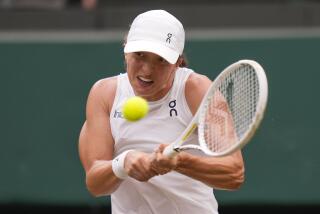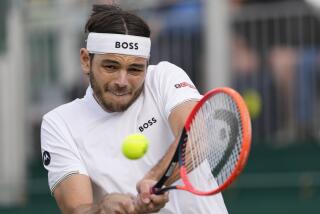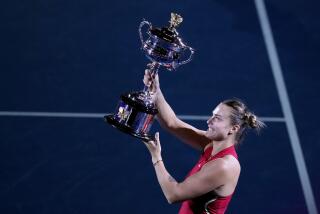Up to His Old Tricks, Connors Stuns Edberg
- Share via
NEW YORK — In a tournament he shouldn’t win, at an age he shouldn’t play, against an opponent he shouldn’t beat, Jimmy Connors fooled them again.
Two days after his 37th birthday, Connors blew third-seeded Stefan Edberg off the court Monday night, 6-2, 6-3, 6-1, in a fourth-round match that was both stunning and controversial.
The match bore Connors’ trademark. He accumulated fines of $2,250 for three code violations, was penalized a game in the second set and was one more code violation from being defaulted.
Two of the code violations were for audible obscenities and the third for unsportsmanlike conduct when Connors argued with chair umpire Richard Ings about the other two code violations.
“I was on a tight string,” Connors said. “I’ve been in controversy my whole career.”
It is Connors’ 20th U.S. Open, which he has won five times, but he was not expected to get past Edberg in his quest for another.
However, Edberg was strangely inadequate on a cool and windy night. He held serve three times in the match and won only five games from Connors on his own. Ings gave him the other.
Connors lost the first game of the second set, during which he got his first code violation. Ings penalized Connors a point and then a game when Connors continued to argue during the changeover.
But from 0-2 in the second set, Connors won 12 of the next 14 games. He broke Edberg’s serve five times in that span and eight times for the match.
Edberg, who said he just had one of those awful nights, double-faulted on match point, a rare collapse for the French Open and Wimbledon finalist.
Said Connors: “I went out and played a match everybody dreams will happen and he played one of those matches you hope you have only one time in your career.”
While Connors was upsetting Edberg, top-seeded Ivan Lendl teetered on the brink of elimination before steadying himself. Lendl needed 3 hours 45 minutes and five sets to defeat Andrei Chesnokov of the Soviet Union, 6-3, 4-6, 1-6, 6-4, 6-3.
It was not a memorable display by Lendl. The world’s top-ranked player made only 50% of his first serves and committed 73 unforced errors.
“It was a very funny feeling,” Lendl said.
Michael Chang probably recognizes the symptoms.
Chang, who lost to Tim Mayotte in the fourth round at Wimbledon, came 3,000 miles west and lost to him again in the fourth round of the U.S. Open, which is obviously some bad scheduling.
It was not a particularly graceful exit for Chang, the French Open champion (he blew a 5-2 lead in the first set), who continually found holding serve to be a slippery task.
Tougher still for Chang was coming through on his goal to improve on last year’s finish at the Open when he also made it to the fourth round and lost.
Chang judged his Open performance as reaching only an “OK level,” thus downgrading the year’s fourth and final Grand Slam to mere good slam status. At least he will always have Paris.
When Mayotte had beaten him again, 7-5, 6-1, 1-6, 6-3, Chang addressed the thought that his Open was a failure.
“I think it’s satisfactory,” Chang said. “The only time you can say something is a failure is if you don’t try.
“It wasn’t like I lost in the first round,” he said. “But I think I could do better than I did, so in that respect, it’s frustrating.”
So the experience was both satisfactory and frustrating for Chang. This is an unusual combination, but also quite understandable given the circumstances.
At Wimbledon, Chang was easy prey for Mayotte, who plays his best tennis on grass, but meeting him again on the hard courts of the Open seemed to represent an opportunity for Chang to even the score with a victory on the surface on which he grew up.
This seemed likely when Chang staked himself to a 5-2 lead in the first set. The match turned when he was serving at 5-3. Chang committed three consecutive unforced errors--he explained later that he was going for too big a shot each time--and Mayotte went on to break him.
Andre Agassi, who has not lost a set, advanced to a quarterfinal showdown against Connors. Agassi, seeded sixth, swept Jim Grabb, 6-1, 7-5, 6-3, in 1 hour 49 minutes.
Mayotte gets another chance to beat Lendl, which he has not done in 13 meetings.
“I’d rather play someone I beat all the time than someone I never beat,” Lendl said.
Joe Chang said his son probably missed a good opportunity to get past Mayotte and try his luck at a rematch of his fourth-round French Open showdown against Lendl.
“He maybe should have won the match,” the elder Chang said. “This was like the first day of the tournament. I think that’s why he’s not very happy.”
Chang’s nature worsened right after he was broken to 5-4. Mayotte won that game and six more in succession to take complete control.
Mayotte said his biggest advantage was on Chang’s second serve. Mayotte won 51% of the points on Chang’s second serve.
“I can take his serve and feel like we’re starting better than equal,” Mayotte said. “His second serve a lot of times is the best approach shot that I’m going to see.”
Down two sets to love, Chang rallied briefly. He broke Mayotte in the first game with a stunning backhand return winner on a second serve and closed out the set in 29 minutes.
“You blink an eye and you lose a set,” Mayotte said.
From then on, Mayotte kept his eyes open. His key was to break Chang in the first game of the fourth set, which meant that when Mayotte held serve for 5-3, the pressure was on Chang to do the same to stay in the match.
At 30-30, Chang lifted a backhand volley long to set up match point for Mayotte, who ended it swiftly with a backhand cross-court volley winner.
Afterward, Mayotte was gracious in his accounts of how he had defeated the French Open champion twice on two different surfaces on two continents in two Grand Slams in two months.
“Obviously, Michael’s a tough mental player,” Mayotte said.
The chance of consecutive Chang-Mayotte encounters in back-to-back Grand Slams is purely the luck of the draw. No matter how Chang tried to put his fourth-round finish in the best possible light, he must have been truly and deeply disappointed.
“It wasn’t like he blew me off the court or anything,” Chang said. “I had my chances in the first set. I was serving at 5-3 and made three errors in a row. You can’t afford to make those.
“(But) it’s been a good year. As far as the French and Wimbledon, I think I did really well. The U.S. Open was OK. It could be better.”
The problem, Joe Chang said, is that Michael never adequately prepared for the hard-court season. Chang needed to rest after his grueling victory in Paris and his fourth-round finish at Wimbledon.
“People don’t realize what it takes to win seven matches on clay, like he did to win the French Open,” Joe Chang said. “He needed rest when he got back from Europe.”
But there was a downside to that. Chang spent little time preparing for the hard-court season. He lost in the quarterfinals at two tournaments and in the second round of two others.
“I think he kind of took the hard courts for granted,” Joe Chang said. “He didn’t prepare for them.”
The big news on the women’s side is that it took more than an hour for Steffi Graf to win her fourth-round match.
Not only was Graf forced to work 1 hour 7 minutes to defeat Ros Fairbank, 6-4, 6-0, she was actually down a service break in the first set.
Fairbank led, 4-2, but Graf didn’t lose another game. This was not so surprising to Graf, who said there was no way she would ever be so consistently bad.
“I can’t continue to play like that,” she said. “It’s impossible.”
Fairbank said she aggravated a hamstring pull in the first set, but pointed out that the way Graf closed out the first set offered very little hope and contributed to her defeatist attitude.
“It allowed her to build on the confidence that she’s had in the past when she is playing against a player of my caliber,” said Fairbank, who is ranked No. 32.
“She feels that I’m not going to win the match. I don’t feel like I believe I can win the match.”
Perhaps Helena Sukova will feel a little more positive when she steps onto the court to meet Graf in the quarterfinals. Sukova, who lost to Graf in the final of the Australian Open, won her fourth-round match over Larisa Savchenko of the Soviet Union, 4-6, 6-1, 6-2.
Sukova had exploratory arthroscopic surgery on her right knee after Wimbledon and didn’t begin practicing for the Open until two weeks ago.
More to Read
Go beyond the scoreboard
Get the latest on L.A.'s teams in the daily Sports Report newsletter.
You may occasionally receive promotional content from the Los Angeles Times.










